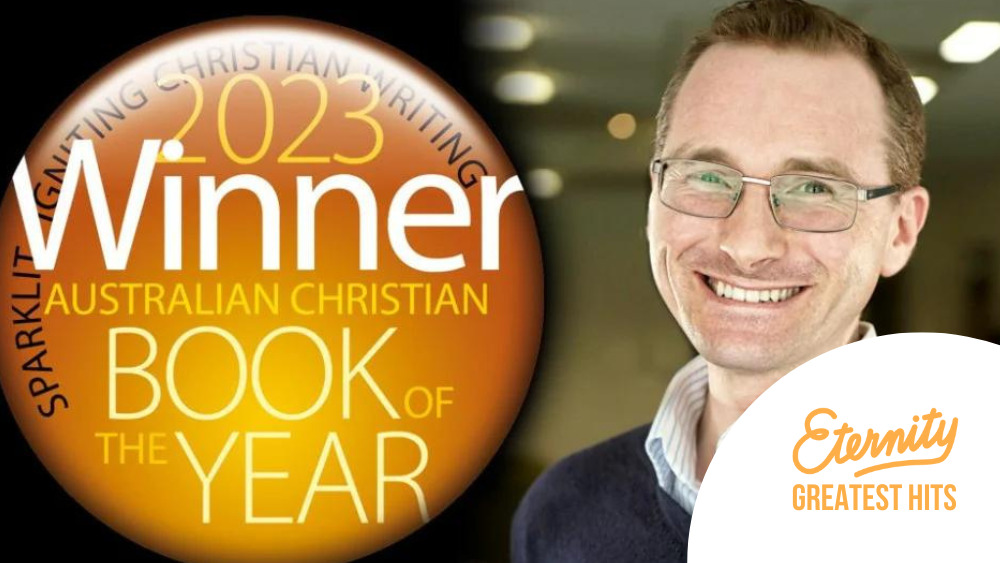Eternity is revisiting some of the stories our staff writers most loved writing.
Eliot Kern, Content Producer for Eternity, chose this story as one of his best interviews. He says, “Christians tend to dismiss the secular thinkers behind so much of our culture. Chris Watkin has done the work to understand not only their mistakes, but also their insights, their longings and their humanity. He has also done the work of holding these ideas up to the light of God’s word and seeing not only where the Bible exposes flaws, but also where it illuminates valuable insights and reconciles cultural half-truths.
“It was refreshing to meet such a unique guy with such unique life experience.”
With two kids under ten, Chris Watkin jokes that he and his wife Alice are “dripping with spare time”. But despite these cherished hobby-hinderers, he managed to write a huge, disarmingly readable tome: Biblical Critical Theory: How the Bible’s Unfolding Story Makes Sense of Modern Life and Culture.
If the word ‘tome’ makes your eyelids heavy, let me warn you not to judge this book by its cover. Watkin specialises in making sense of how people make sense of the world, and communicates exhilarating ideas with ease. This success in producing an incredibly accessible guide to engaging with culture as a Christian was no accident.
“My first reader was my younger self,” Chris explains. As an undergraduate student in a large arts faculty of a secular university, he churned out essays on Karl Marx, Sigmund Freud, and Freidrich Nietzsche, as well as more obscure modern European thinkers. (Throughout our conversation, Chris mentions philosophers of whom I, a philosophy major, have never heard.) But at the same time, he recalls, he was “seeking to live – very imperfectly – as a Christian, to take the Bible seriously, to read it carefully, and so forth.”
Chris searched for a Christian book that engaged deeply with these secular philosophers, articulating their thoughts in a way they themselves would embrace, but which also took the Bible seriously, not recreating Christianity in the image of philosophy’s latest trend.
He noticed a tendency either to foreground the Bible woodenly, barely engaging with culture, or relegate the Bible to the background, embracing culture entirely. “I’d never found that tension in my own experience or in the church I was going to,” he explains. So, he set out to write the book himself.
“I want to encourage Christians,” he concludes, “that the power and the joy of rich and deep cultural engagement is to be found not by taking a step back from the Bible and losing ourselves in all sorts of philosophical or sociocultural ideas, but by pressing into the text of the Bible and the shape of the biblical narrative.”
“There was something about Jesus that I didn’t have categories for.” – Chris Watkin
One answer to two mysteries
Some are drawn to Jesus by the attractiveness of Christian community; others are convinced of his trustworthiness by arguments and evidence. “For me,” Chris recalls, “it was very much a combination of the two.”
When he started attending a local church in the north of England, Chris knew very little about the Bible. But over about a year and a half, it became clear to him that Jesus could not be dismissed. “There was something about him that I didn’t have categories for,” he explains.
In Jesus, Chris saw profound wisdom, maturity, realism and authenticity. But he also heard outrageous claims and seemingly incomprehensible parables. “How can he be so utterly level-headed and clear-sighted,” he wondered, “and yet so away with the fairies to claim to be a deity? People who claim to be gods are in institutions, and people who are very wise are wise enough not to claim to be gods, but this is someone doing both.”
“Why are these people, who ought not to have anything in common, loving each other so much?”
As Chris struggled to make sense of Jesus, he experienced the “wonderful warmth of the church community” with whom he gathered. “I was discipled by a fireman, a hairdresser, and a secretary,” he recalls, “and they all oozed godliness – gentle, loving, kind – but also a very clear and uncompromising commitment to Jesus.”
Despite growing up in a loving family, Chris again struggled to make sense of this community. “Why are these people, who ought not to have anything in common, loving each other so much?” he marvelled.
The epiphany came when Chris found one answer to both mysteries: “Jesus is actually who he says he is, and these people are full of his spirit; they love each other because they are loving him; he is drawing them together. That made sense of it all.”
In his book, Chris hopes non-Christian readers will see an unfamiliar Christianity, recognising both the Christian roots of many precious beliefs and the attractiveness of the biblical vision for society and human flourishing.
Chris acknowledges that Christians deserve criticism when they behave unlike Christ. But he also recognises an anti-Christian trend in cultural sentiment and welcomes the chance to highlight the unique vision of the Bible for human flourishing.
How the Bible heals
In the years since coming to Christ, Chris often finds the word of God wrestling him away from wordly extremes back to biblical harmonies. Much of the book is devoted to demonstrating the cultural implications of this ‘diagonalising’ dynamic.
But as a personal example, Chris says the Bible has rescued him from ‘the besetting sin of many academics’.
“One blessing of reading the Bible (and a wonderful blessing of marriage) is that my propensity to lose myself in ideas is tempered and limited by the fact that relationships are so fundamental to the whole Bible,” he explains.

“The glorious thing about the Bible, that I don’t think is shared by any modern philosophers that I’m aware of, is that a little child can embrace and understand it fully – in the sense that they’re a ‘proper Christian’; they know the Lord Jesus Christ. And yet someone like Augustine of Hippo, with a brain the size of a planet, can spend his whole life immersing himself in the Bible and just scratch the surface. You don’t have to be an intellectual person to be a proper, full, bona fide, fair dinkum Christian, yet you’re never going to exhaust this book.”
If you want to immerse yourself more deeply in God’s word, Chris’ book is a great place to start. Asked whether Biblical Critical Theory is his magnum opus, he shrugs. “If that’s what the Lord wants, then that sounds good to me. If he wants me to write something else, then I’m up for that. He’s in charge, so I’ll learn when he wants me to know.”
Chris Watkin is a researcher, lecturer and author, lecturing in French studies at Monash University in Melbourne.


